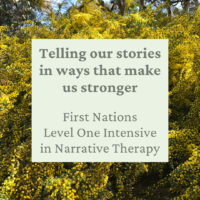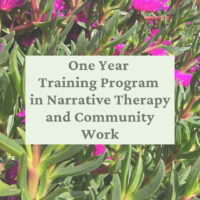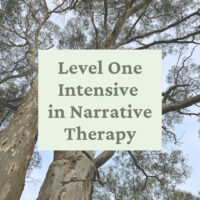Level One Intensive November 2024 (in-person)
$1,200.00
Presenter: Dulwich Centre Faculty
Date: 4th – 8th November 2024
Time: 9.30am – 4.30pm (Adelaide time)
Location: Dulwich Centre in Adelaide, SA
Cost: AUD$1200 (incl. 10% GST)
Details
This intensive will be taught in English with an Australian accent! It’s necessary to have a very good grasp of spoken English as there’s lots of discussion in small groups, practical exercises, and interactive classroom discussion.
This one week intensive training will provide an immersion in the practices of narrative therapy. Narrative therapy centres people as the experts in their own lives and views problems as separate from people. Narrative approaches assume that people have many skills, competencies, beliefs, values, commitments and abilities that will assist them to reduce the influence of problems in their lives. The word ‘narrative’ refers to the emphasis that is placed upon the stories of people’s lives and the differences that can be made through particular tellings and re-tellings of these stories. Narrative therapy involves ways of understanding the stories of people’s lives, and ways of re-authoring these stories in collaboration between the therapist and the people whose lives are being discussed. It is a way of working that is interested in history, the broader context that is affecting people’s lives and the ethics or politics of this work. It is a hopeful approach.
When using narrative approaches, it is often possible to address serious problems in playful and respectful ways. This one week workshop has been specifically designed for those who are relatively new to narrative ways of working or those who have had some exposure to the ideas and would now like the opportunity to more rigorously engage with narrative practices.
This course will feature a review of key narrative ideas and practices, including recent developments, including: Externalising conversations: the person is not the problem, the problem is the problem; Re-authoring conversations: telling our stories in ways that make us stronger; Outsider-witness practices: linking lives and the use of audiences; Re-membering conversations: considering the memberships of our lives; Listening for alternative storylines; Documenting change: The use of letters and certificates. Stories of therapeutic conversations, videotapes, transcripts and therapeutic letters will be shared that relate to work with adults, children and families. Detailed descriptions and illustrations of maps for therapy will be given.
What is more, during the week, many opportunities will be provided for participants to develop their own skills in narrative questioning through training exercises. We have found this to be particularly helpful in order for participants to then be able to use narrative practices in their own work context. This intensive workshop will be relevant to counsellors, therapists, psychologists, social workers, welfare workers… indeed anyone who is working with the stories of people’s lives.




